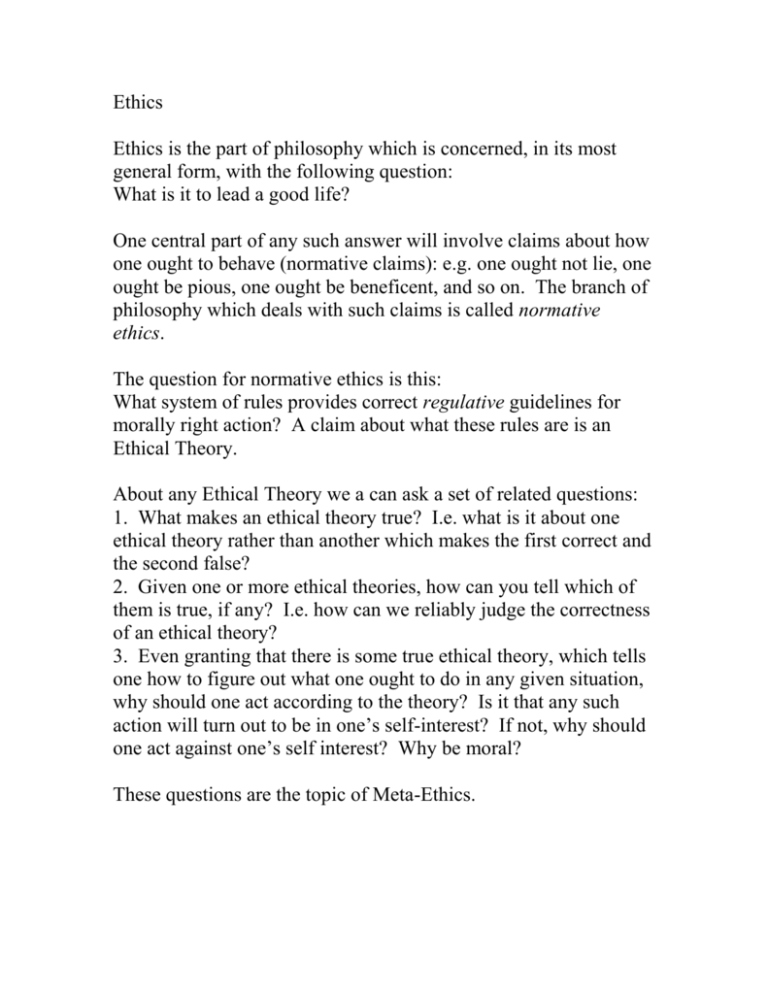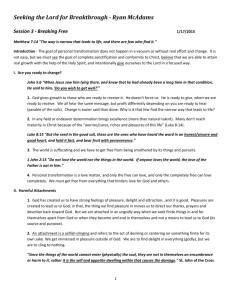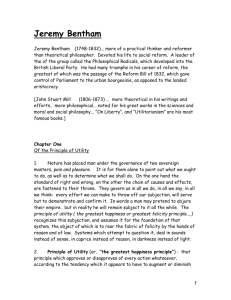Psychological Egoism
advertisement

Ethics Ethics is the part of philosophy which is concerned, in its most general form, with the following question: What is it to lead a good life? One central part of any such answer will involve claims about how one ought to behave (normative claims): e.g. one ought not lie, one ought be pious, one ought be beneficent, and so on. The branch of philosophy which deals with such claims is called normative ethics. The question for normative ethics is this: What system of rules provides correct regulative guidelines for morally right action? A claim about what these rules are is an Ethical Theory. About any Ethical Theory we a can ask a set of related questions: 1. What makes an ethical theory true? I.e. what is it about one ethical theory rather than another which makes the first correct and the second false? 2. Given one or more ethical theories, how can you tell which of them is true, if any? I.e. how can we reliably judge the correctness of an ethical theory? 3. Even granting that there is some true ethical theory, which tells one how to figure out what one ought to do in any given situation, why should one act according to the theory? Is it that any such action will turn out to be in one’s self-interest? If not, why should one act against one’s self interest? Why be moral? These questions are the topic of Meta-Ethics. Psychological Egoism Psychological Egoism is the thesis that all human actions are selfish. Or, slightly differently, no human actions are altruistic. An action can be understood as a behavior undertaken for some purpose. Psychological egoism is a claim about the nature of the purposes for which humans behave in one way rather than another. There are several versions of the thesis, which vary in how the word ‘selfish’ is understood: 1. These purposes are always those of the person who acts. 2. These purposes are always to satisfy some desire had by the agent who acts. 3. These purposes are always to give pleasure (or happiness) to the person who acts. Version 3 is sometimes called Psychological Egoistic Hedonism. Feinberg considers several defenses for psychological egoism, each a defense of one of these three versions of the thesis. Defense 1: By definition, in acting we strive to achieve some end, and achieving that end is the purpose of our actions. The purpose, the motive, must be that of the person who acts, otherwise the purpose could not motivate the person to act. Defense 2: When the end for which we undertake an action is achieved, when the purpose of the action is satisfied, the actor typically feels pleasure. So we might think that there is a general aim or purpose for all actions, the creation of pleasure for the actor. Defense 3: We often deceive ourselves that our actions are undertaken from some lofty or altruistic goal, when in fact we act as we do only to serve our more immediate and less laudable interests. Once we are aware of our tendency to self-deception, we might reasonably think that whenever it appears that we act for reasons that are not self-regarding, there are really underlying motives which are not virtuous, or altruistic, but simply concern our own well-being, our own pleasure and happiness. Defense 4: As a matter of fact, we teach moral behavior by rewarding good behavior and punishing bad behavior, so that children learn to behave well because it is in their self-interest to behave well. And as a general matter, even adults tend to behave well only when they stand to benefit from so doing, either because such behavior is rewarded, or the failure to behave well is punished (most of us would frequently exceed the speed limit in quite unsafe ways were it not for the possibility of financially ruinous fines). This suggests that people are always motivated by self-interest. The first defense aims to support the first two versions of the thesis, and in fact succeeds. The problem is that the first two versions of the thesis do not really rule out the possibility of unselfish acts. The first and second versions of the thesis are correct: one always acts for one’s own purposes and these purposes are always to satisfy some desire one has. These are simply tautologies (claims that are necessarily true in virtue of the meanings of the words used to express them). However, it does not follow from this that one’s actions are always selfish in the relevant sense. In particular, if one’s desire, and so one’s purpose, is to make another better off, even at some cost to one’s other interests, then one’s purpose and the desire it satisfies are not selfish. Nothing in the first defense, or for that matter in the first two versions of the thesis, rules out such unselfish motives. An action is selfish only if the purpose which motivates it is selfish, and the purpose is selfish only if the aim of the action, the desire it is supposed to satisfy, is selfish. Versions 1 and 2 of the thesis leave it open that some actions might have unselfish purposes. The second defense is aimed at version 3 of the thesis. But it fails, for several reasons: A. It does not follow from the fact (if it were one) that all successful actions bring pleasure to the persons who act that the point of acting was to bring such pleasure. B. It is false that every successful action brings pleasure. An action is successful if it brings about the satisfaction of the desire that motivated it, i.e. if it achieves its purpose. But some successful actions do not bring pleasure to the person who acted. C. If we define ‘pleasure’ to include ‘desire satisfaction’, and define this to occur whenever ‘we get what we want’, then we do have here a defense of version 3 of the thesis. But we have done so only by turning version 3 of the thesis into an empty tautology that says no more than versions 1 and 2—we act (by definition) for purposes, those purposes (by definition) our always ours, and we (by definition) are satisfied when those purposes are realized, and hence, since such satisfaction is (by definition) a kind of pleasure, successful actions always produce pleasure (by definition). What does not follow from the now tautologous reading of version 3 is that in acting we always have selfish purposes. Feinberg claims there is a counter-argument to version 3. Suppose you act in order to ease the plight of someone else, say Igor. It may be that easing Igor’s plight (say he is pan-handling on a cold winter day, and you give him 5 bucks to buy a hot meal) also causes you pleasure, in that had you not eased his plight, you would have been bothered all day by the thought of his suffering. So your action has eased both his plight and your own discomfort at his plight. The psychological egoist wants to say that the real reason for your action, its real purpose, was only the latter. But, says Feinberg, that cannot be right. For if you had no prior concern for Igor beyond easing your own discomfort, you wouldn’t feel discomfort at his plight, and so would feel no need to ease it in order to avoid your own discomfort. In general then, I can aim to serve my own happiness by serving the happiness of others only if I have some prior concern for their happiness independently of whatever effect their happiness has on my own. And that concern is necessarily unselfish, and a legitimate reason for acting. Hence, it generates a legitimate motive for action. That motive is unselfish, and so the actions it produces are unselfish. The counter argument is not conclusive, since there are other possible sources for our own pleasure at beneficent acts than some prior concern with others. For example, we might enjoy the benefits of praise and the good-regard of others if we act heroically, or we might desire the gratitude of others, which we receive when we behave in apparently altruistic ways. Defense 3 claims there are always such self-regarding desires to be found behind apparently unselfish acts. Feinberg says there is here no logical error, but there is a lack of evidence. It is simply not clear that such selfish desires are always to be found, or that they are always sufficient to actually motivate persons to act. Moreover, since there are many apparently unselfish and altruistic acts, such a sweeping generalization requires a great deal of evidence, which is simply not available. So Defense 3 should not be accepted as things now stand. Further, it is not clear that it really makes sense to think that all actions can be motivated simply by a desire for pleasure, without some prior concern with things other than one’s own pleasure, where the satisfaction of these other-regarding desires is what brings pleasure. The idea is simply that the best way to find happiness is not to seek it, but rather seek success in something else—the beauty of nature, the joy of skiing, success in business or politics, and so on. If you then achieve success in your projects, this may bring you pleasure and happiness. But if you just seek happiness for its own sake, without any concern for other projects, there is nothing for you to find happiness in, and so you will not find it. Feinberg calls this the Paradox of Hedonism. In sum then, Feinberg says: pleasure can be defined as a kind of sensation, or as the satisfaction of desires. If the first, then Psychological Egoistic Hedonism is a clear thesis, but it is not supported by the facts, as they now stand. If the second, then Psychological Egoistic Hedonism either reduces to a tautologous truth (as in versions 1 and 2), or it can not even be stated coherently, since it says that all people act to satisfy their desire (for satisfaction of their desires (for satisfaction of their desires (for…))) Finally, Feinberg considers the possibility that a Psychological Egoist might allow that other motives than simply the desire for pleasure can move people to act, but hold that all such motives are selfish. Version 4: All persons act for selfish purposes, i.e. they act from motives that are self-regarding rather than other-regarding in some important sense. Feinberg says this is fine, so long as we know how to distinguish selfish from unselfish motives (i.e. self-regarding from otherregarding purposes); more specifically, we need to know what the Psychological Egoist would count as evidence against his theory. If we are not told what would count as evidence against the theory, then the theory simply redefines the term ‘selfish’. The redefinition will no longer capture the contrast we mean to pick out in our everyday use of the terms ‘selfish’ and ‘unselfish’. Since that contrast is important for moral evaluation, we will have to introduce new terms to capture it. If we are told what would count as evidence against the theory, e.g. we are told why Aunt Emma’s act of apparent generousity is really selfish, then the theory is a real empirical theory. But again, it lacks the appropriate evidence.






